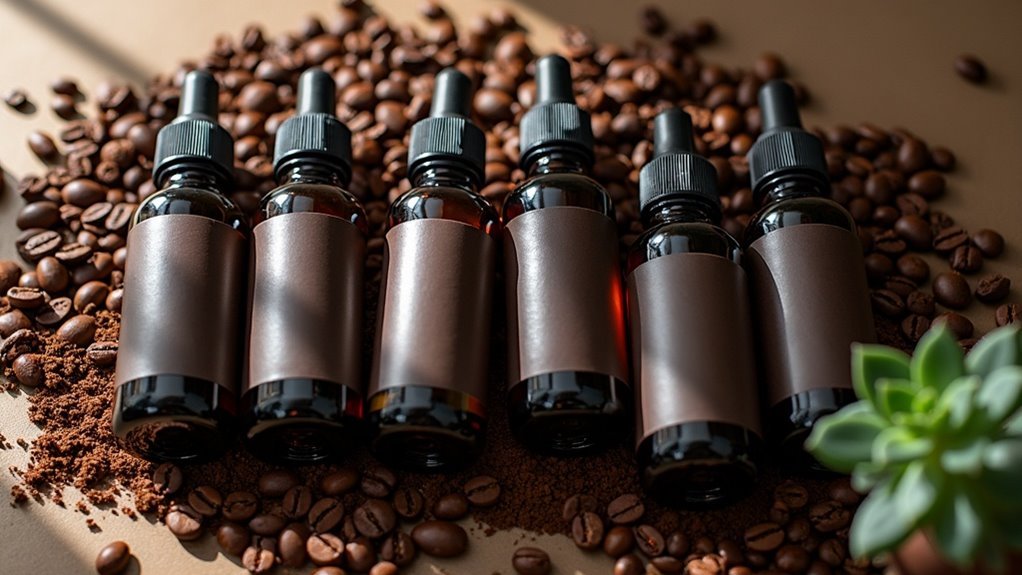Strictly Hard Bean (SHB) coffee is a premium variety grown at altitudes of 4,500 to 5,000 feet, where cooler temperatures contribute to denser beans with a complex flavor profile. You’ll discover rich notes of berry and chocolate as a result of the slow ripening process. The meticulous hand harvesting enhances its quality, making it highly sought-after in specialty coffee markets. Understanding its characteristics can elevate your appreciation for this unique coffee. There’s so much more to explore about its origins and impacts on the coffee industry.
Key Takeaways
- Strictly Hard Bean (SHB) coffee is grown at altitudes ranging from 4,500 to 5,000 feet, producing beans that are denser and harder.
- The cooler temperatures found at these high elevations contribute to a complex flavor profile, often highlighting notes of berry and chocolate.
- The production of SHB coffee necessitates careful hand harvesting, which ensures a high level of quality and reflects the dedication of local farmers.
- In Guatemala, over 90% of coffee is classified as Specialty Grade, with many of these coffees being designated as SHB due to their superior quality.
- The high elevation associated with SHB coffee cultivation enhances nutrient delivery, resulting in richer flavors and a highly sought-after status within the specialty coffee market.
Definition of Strictly Hard Bean Coffee
Strictly Hard Bean (SHB) coffee is defined by its growth at altitudes ranging from 4,500 to 5,000 feet above sea level, where cooler temperatures play an essential role in the development of the beans.
This elevation contributes to a higher density and hardness, allowing the beans to ripen slowly, which enhances their intense flavor profile. SHB coffee often exhibits complex notes of berry and chocolate, making for a rich tasting experience.
Additionally, the labor-intensive harvesting process, typically done by hand, ensures quality and reflects the dedication behind this specialty coffee that’s cherished by connoisseurs.
Characteristics of SHB Coffee
When you explore the characteristics of Strictly Hard Bean (SHB) coffee, you’ll discover that its unique flavor profile stems from the high-altitude conditions in which it’s cultivated.
Grown between 4,500 and 5,000 feet, SHB beans develop denser structures and richer flavors due to the slower ripening process. This results in an intricate taste experience, often featuring intense notes of berry and chocolate, paired with a smooth aftertaste.
Although the labor-intensive harvesting adds costs for farmers, the premium prices SHB coffee commands reflect its high quality. Notably, over 90% of Guatemalan coffee is Specialty Grade, with many being exceptional SHB beans.
Importance of High Elevation in Coffee Production
High elevation plays a crucial role in coffee production, especially for beans like Strictly Hard Bean (SHB), which flourish at altitudes between 4,500 and 5,000 feet.
At these elevated heights, the slower maturation process enhances nutrient delivery, resulting in greater flavor complexity. SHB beans are typically denser and harder, leading to richer flavors and increased nutrient density compared to beans grown at lower altitudes.
Although farming at such heights presents challenges in terms of labor and transportation, the superior quality often leads to higher market prices, making high-elevation coffee a prized choice in the specialty market for its distinctive flavor profiles.
Comparison With Other Coffee Standards
When you compare Strictly Hard Bean coffee to other coffee standards, the elevation plays a vital role in defining quality and flavor.
SHB coffee, grown at higher altitudes, offers a complex flavor profile with rich notes that lower-grade coffees simply can’t match.
Understanding these differences in elevation and grading helps you appreciate why SHB stands out in the specialty coffee market.
High Elevation Benefits
Although many coffee enthusiasts appreciate various types of beans, the advantages of Strictly Hard Bean (SHB) coffee grown at high elevations can’t be overlooked.
SHB coffee, cultivated between 4,500 to 5,000 feet, experiences slower ripening, which enhances both nutrient density and intense flavor. In contrast, standard coffees produce milder flavors and lack the complexity found in SHB varieties.
Even high-grown coffees, while sweeter, don’t achieve the same depth. The rigorous farming conditions at higher elevations result in lower yields but considerably higher quality, making SHB coffees from regions like Guatemala and Kenya truly exceptional with their rich, complex flavor profiles.
Flavor Profile Differences
While many coffee drinkers savor a wide array of flavors, the distinct taste of Strictly Hard Bean (SHB) coffee sets it apart from both Standard and High Grown (HG) varieties. SHB coffee produces a complex flavor that has notes of berry and chocolate, offering an intense experience thanks to its higher elevation. In comparison, Standard coffee tends to provide milder flavors, while HG coffee, although sweet, lacks the deep richness of SHB. Here’s a quick comparison:
| Coffee Type | Flavor Profile |
|---|---|
| SHB | Berry, Chocolate, Intense |
| Standard | Milder, Simple |
| HG | Sweet, Smooth |
| SHB Density | More Dense |
Whether you prefer the robust and intricate flavors of SHB or the simpler profiles of Standard and HG coffees, there’s a perfect cup for every palate!
Quality Grading Standards
Understanding the quality grading standards of coffee is essential for coffee enthusiasts, especially when comparing Strictly Hard Bean (SHB) coffee to other varieties.
SHB coffee, grown at altitudes of 4,500 to 5,000 feet, is known for its higher density and remarkable flavor complexity, which results from the slower ripening process at these elevations. In contrast, Standard coffee, cultivated at lower elevations, typically offers milder flavor profiles and often doesn’t meet the rigorous quality grading of SHB.
Specialty coffee standards classify SHB as part of the top 3% of coffees globally, requiring a score of 80 or above on a standardized tasting scale, with a strict criterion of zero primary defects and no more than five secondary defects.
This ensures that SHB coffee provides a superior tasting experience compared to lower-grade coffees, making it a prized choice for coffee lovers.
Regions Known for SHB Coffee
When exploring the world of Strictly Hard Bean (SHB) coffee, you’ll discover that its unique flavor and density are closely linked to the specific regions where it’s cultivated.
SHB coffee flourishes at altitudes of 4,500 to 5,000 feet, which enhances both bean density and flavor complexity. Notable regions for SHB coffee include Guatemala, especially Antigua, renowned for its rich flavor profiles.
Costa Rica is celebrated for producing smooth, intense flavors, while Kenya is known for its vibrant acidity and berry notes.
Ethiopian and Tanzanian coffees offer distinct floral and fruity characteristics, while Sulawesi contributes earthy, complex notes.
Together, these regions create a diverse landscape of high-quality SHB coffee enjoyed by enthusiasts around the globe.
Flavor Profile of Strictly Hard Bean Coffee
As you explore the flavor profile of Strictly Hard Bean (SHB) coffee, you’ll discover that its density and cultivation altitude significantly impact its taste.
Grown at impressive elevations of 4,500 to 5,000 feet, SHB beans develop intricate flavors, with bold notes of berry and chocolate taking center stage. A medium roast enhances these qualities while achieving a harmonious balance between flavor intensity and acidity.
You’ll enjoy a smooth aftertaste that lingers, often accompanied by lovely hints of caramel, vanilla, and other fruity undertones. This complex flavor profile is a testament to the meticulous harvesting and careful cultivation processes involved, making SHB coffee a highly sought-after choice among coffee enthusiasts.
Care and Storage Tips for Optimal Freshness
To ensure your Strictly Hard Bean coffee remains at its peak freshness, store it in a cool, dark location, away from heat sources such as the stove.
Utilizing airtight packaging is crucial, as it minimizes air exposure that can swiftly diminish flavor and aroma.
For optimal freshness, aim to enjoy your coffee within two to four weeks after opening.
Ideal Storage Locations
Storing Strictly Hard Bean coffee in the right environment is essential for maintaining its rich flavor profile and overall quality.
Always choose a cool, dark place to store your coffee, avoiding areas near the stove or other heat sources that can degrade flavor quality.
The original packaging is ideal, as it often includes an airtight seal; be sure to reseal it tightly after each use.
This protects against moisture and oxygen, both of which can compromise your coffee’s integrity.
Airtight Packaging Importance
Choosing the right storage method significantly impacts the quality of Strictly Hard Bean coffee, and airtight packaging is crucial. Airtight containers prevent oxidation and flavor deterioration by limiting exposure to air and moisture. Always reseal your coffee tightly after use to maintain its freshness. Store your coffee in a cool, dark place, away from heat sources that can accelerate staling.
| Factor | Importance |
|---|---|
| Airtight Packaging | Prevents oxidation |
| Resealing After Use | Limits moisture intrusion |
| Proper Location | Protects from heat and light |
Implement these practices for optimal coffee storage.
Maintaining Flavor Freshness
While you might think that brewing is the only factor affecting your Strictly Hard Bean coffee’s flavor, proper care and storage are equally vital for maintaining its freshness.
Store your coffee in a cool, dark place to protect it from heat and sunlight, which can dilute its flavor. After opening, keep the original packaging sealed tightly or use an airtight container. Reseal after each use to minimize air exposure that degrades quality.
Avoid warm areas, like near the stove, to preserve the rich taste profile of this high elevation coffee. Proper storage guarantees your Strictly Hard Bean remains flavorful and fresh. Enjoy every cup to its fullest!
The Impact of SHB Coffee on Local Economies
The cultivation of Strictly Hard Bean (SHB) coffee significantly impacts local economies by creating job opportunities and improving the overall quality of life for farmers and their communities. The premium prices associated with SHB coffee enable farmers to invest in sustainable farming practices and community infrastructure. This investment results in improved access to education and healthcare, further elevating local economies. Moreover, SHB coffee builds a strong reputation that attracts tourism, thereby increasing visibility for local brands. It also promotes fair trade initiatives, encouraging ethical consumption that benefits the farmers.
| Impact | Description | Benefits |
|---|---|---|
| Employment Opportunities | Labor-intensive harvesting creates jobs | Increased local income |
| Sustainable Farming | Revenue allows investment in sustainable practices | Long-term viability |
| Community Infrastructure | Revenue enhances services like education | Improved quality of life |
| Tourism | High-quality SHB coffee attracts visitors | Boosts local economy |
| Fair Trade Initiatives | Encourages ethical consumer support | Improved livelihoods for farmers |








